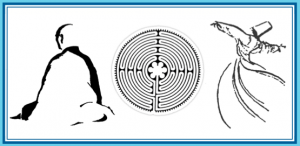The Language of Meditation Across Religious Traditions
Panel Discussion and Workshop: Public Event
Sunday, April 7, 2013 1-6 PM
Mangalam Research Center
2018 Allston Way, Berkeley
Meditation has become widely accepted in the West as a ‘technique’ for relaxation, stress reduction, inner clarity and access to ‘elevated’ states of consciousness. Yet the fact that the term meditation, and the terms contemplation, reflection, and prayer, have come to mean so many different things, to some many different people, and in so many different ways — not to mention the growing interest in how to understand meditation in terms of modern science — has left many of us overwhelmed and bewildered about where to even begin embarking upon spiritual or meditative practice.
How can the ancient scriptures that ground meditative traditions affect practice in living faith traditions? How have the concepts of meditation, prayer and contemplation been transmitted across time, space and cultures?
The Mangalam Research Center for Buddhist Languages is pleased to host a Panel Discussion and Experiential Workshop that will explore these questions and more. This is an opportunity to enrich your theoretical and practical understanding of meditative practices within, and in dialogue between, the world’s major spiritual traditions. download flyer [PDF]
Audio Recording of the Panel (1:45:04, 192MB)
Schedule for Sunday, April 7
1:00-2:30 PM: Panel Discussion
Meditation across Traditions: Bridging Theory and Practice
3:00-6:00 PM: Experiential Workshop
Varieties of Meditative Experience
Three sessions, about 45 minutes each, with time for discussion
Prof. Robert Buswell: Zen ‘Questioning Meditation’ (koan) and Buddhist Mindfulness Practice
Prof. Carl McColman: Christian Meditation, Contemplation and Mental Prayer
Prof. Alan Godlas: Sufi Vocal and Silent Meditation
Participants
Robert E. Buswell Jr. holds the Irving and Jean Stone Endowed Chair in Humanities and Distinguished Professor of Buddhist Studies in the Department of Asian Languages and Cultures at the University of California, Los Angeles. As well as being the author of numerous full-length works and scholarly articles, he is also the editor-in-chief of the Encyclopedia of Buddhism and co-editor of the forthcoming Princeton Dictionary of Buddhism, and in 2009 he was awarded the prestigious Manhae Grand Prize in Korea in recognition of his pioneering contributions to establishing Korean Buddhist Studies in the West. A leading expert on Korean Buddhism and East Asian Zen, he spent seven years as an ordained Buddhist monk in Thailand, Hong Kong and Korea before returning to the academic world.
Alan A. Godlas is an Associate Professor in the Department of Religion at the University of Georgia where he teaches Arabic, Islamic Studies and World Religions. With a background in Ecological Psychology and Gestalt Therapy, and having studied Persian in Tehran and Arabic in Cairo, he specializes in the study of Qur’anic commentary (tafsir), Hadith, Islamic (Sufi) spirituality, and consciousness transformation. Dr. Godlas has practiced various forms of Sufi meditation since 1973.
Carl McColman is a writer, speaker, retreat leader and spiritual director widely known for his work The Big Book of Christian Mysticism and for his expertise in the mystical and contemplative dimensions of both Christian and world spirituality. He received his training at the Shalem Institute for Spiritual Formation and Institute for Pastoral Studies in Atlanta, and is a Lay Cistercian of Our Lady of the Holy Spirit, a community under the guidance of the Trappist order.
Jack Petranker is Director of the Mangalam Research Center for Buddhist Languages and the Center for Creative Inquiry. A meditation teacher and former Dean of the Tibetan Nyingma Institute, Berkeley, he has also served as North American Vice President of the World Fellowship of Buddhists (1988-92). His academic work is in the fields of consciousness studies and organizational change.
Eleanor Rosch is Professor of the Graduate School in the Department of Psychology at the University of California, Berkeley. She works on the intersections between psychology and religious contemplative practices, particularly Buddhist meditation and mindfulness practices, as well as working in the field of cognitive science. She is also an experienced meditation teacher in the Tibetan/Shambhala Buddhist tradition.


